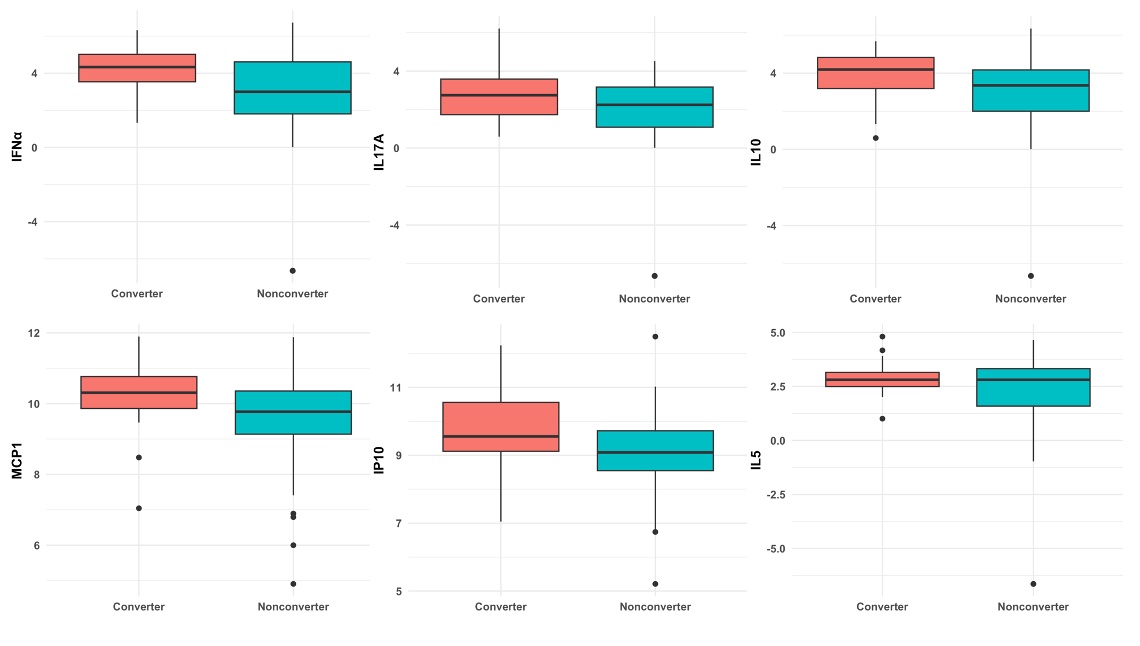Session Information
Date: Wednesday, November 15, 2023
Title: Abstracts: RA – Diagnosis, Manifestations, and Outcomes IV: Pre-RA & RA Diagnosis
Session Type: Abstract Session
Session Time: 11:00AM-12:30PM
Background/Purpose: Rheumatoid arthritis (RA) has a ‘pre-RA’ period definable as elevations of antibodies to citrullinated protein antibodies (ACPA) before clinically-apparent inflammatory arthritis (i.e. Clinical RA). ACPA elevations are highly associated with the future development of Clinical RA; in addition, biomarkers such as cytokines and chemokines in the pre-RA period may improve the prediction of future Clinical RA as well as identify biologic pathways related to disease development that could ultimately be targeted with preventive interventions. In this study, we evaluated 45 cytokines and chemokines in cohort of ACPA+ individuals without Clinical RA at baseline.
Methods: Through testing of first-degree relatives of patients with established RA, health-fair screening and clinic referral evaluations, we identified 85 ACPA+ individuals (CCP3, Werfen) who had no history or physical examination evidence of inflammatory arthritis. All ACPA+ individuals were followed prospectively for Clinical RA development. We tested their baseline serum samples for 45 cytokines and chemokines (Table 2) using a Luminex platform and evaluated differences in log-transformed levels between ACPA+ individuals who did (or did not) later develop Clinical RA, including standard p-values as well as false discovery rate (FDR) corrected p-values to account for multiple comparisons.
Results: 85 ACPA+ individuals were followed longitudinally for a median of 639 days, and 23/85 (27%) developed Clinical RA (‘Converters’) a median of 589 days after their baseline visit (Table 1). At their baseline visit, the Converters had higher rates of positivity for RF-IgM and IgA than Nonconverters. In addition, Converters had higher levels of MCP1, IP10, IFN-alpha, IL10, IL17A and IL5 at a standard p< 0.05 level (Figure 1). Of these, IFN-alpha was significantly elevated in Converters compared to Nonconverters at an FDR-corrected p-value of < 0.05, with trends of higher levels of IL10 and IL17A in Converters vs Nonconverters (FDR p< 0.1).
Conclusion: Multiple cytokines and chemokines are elevated at baseline in ACPA+ individuals who develop clinical RA in a median of 589 days compared to those who do not. The most significant difference was the elevation of IFN-alpha, with trends of IL10 and IL17A. These 3 cytokines have multiple immunologic effects and in particular their elevations may indicate a role for viral infections and/or mucosal and innate immunologic processes in the transition from ACPA+ state to Clinical RA. Future studies will evaluate whether these cytokines improve the ability to predict future RA, as well as role of these cytokines and related biologic processes in the evolution from pre- to Clinical RA.
Disclosures: D. Carlson: None; C. Carpenter: None; S. Goff: None; J. Seifert: None; L. Moss: None; M. Feser: None; J. Buckner: Bristol-Myers Squibb(BMS), 2, gentibio, 1, 10, 11, hotspot therapeutics, 2, Janssen, 2; W. Robinson: None; J. Kirschmann: None; G. Firestein: Eli Lilly, 5; M. Holer: None; K. Deane: Bristol-Myers Squibb(BMS), 1, Gilead, 5, Janssen, 5, Werfen, 1, 12, Biomarker kits.
To cite this abstract in AMA style:
Carlson D, Carpenter C, Goff S, Seifert J, Moss L, Feser M, Buckner J, Robinson W, Kirschmann J, Firestein G, Holer M, Deane K. Cytokine and Chemokine Elevations in ACPA+ Individuals Suggest Possible Viral, Mucosal and/or Innate Responses Are Related to the Transition to Future Clinical RA [abstract]. Arthritis Rheumatol. 2023; 75 (suppl 9). https://acrabstracts.org/abstract/cytokine-and-chemokine-elevations-in-acpa-individuals-suggest-possible-viral-mucosal-and-or-innate-responses-are-related-to-the-transition-to-future-clinical-ra/. Accessed .« Back to ACR Convergence 2023
ACR Meeting Abstracts - https://acrabstracts.org/abstract/cytokine-and-chemokine-elevations-in-acpa-individuals-suggest-possible-viral-mucosal-and-or-innate-responses-are-related-to-the-transition-to-future-clinical-ra/



